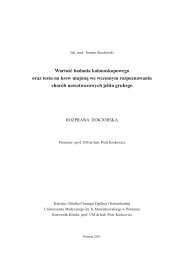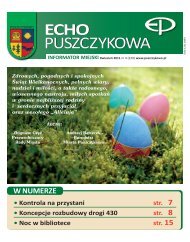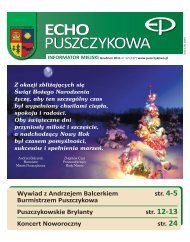MILITARY PHARMACY AND MEDICINE
MILITARY PHARMACY AND MEDICINE
MILITARY PHARMACY AND MEDICINE
Create successful ePaper yourself
Turn your PDF publications into a flip-book with our unique Google optimized e-Paper software.
© Military Pharmacy and Medicine • 2012 • 4 • 1 – 16Jerzy Z. Nowak: Age-related macular degeneration (AMD): a critical appraisal …OphthalmologyAge-related macular degeneration (AMD): a critical appraisal ofdiet and dietary supplements as therapeutic modalitiesJerzy Z. NowakDepartment of Pharmacology, Chair of Pharmacology and Clinical Pharmacology of Medical University ofLodz, PolandAuthor’s address:Jerzy Z. Nowak, Department of Pharmacology, Medical University, ul. Żeligowskiego 7/9, 90-752 Lodz, Poland;phone: ( + 48) 42 6393270, e–mail: jerzy.nowak@umed.lodz.plReceived: 2012.10.12 • Accepted: 2012.11.22 • Published: 2012.12.08Summary:Age-related macular degeneration (AMD) is a vision-threatening ocular disease, affecting the central regionof the retina — the macula — and manifesting in the elderly. Its pathogenesis is multifactorial, molecularlycomplex and only poorly recognized. AMD is a degenerative disease, and the degeneration affects primarilythe retinal pigment epithelial (RPE) cells and secondarily the photoreceptors, which leads to disturbances orpartial loss of central vision and legal blindness. Principal processes contributing to the development of thedisease include: oxidative stress, lipofuscinogenesis, drusogenesis and local inflammation (so-called parainflammation).A severe complication of clinically recognized dry form AMD (geographic atrophy) is theaggressive neovascularization originating from choriocapillary system (CNV; wet form AMD). At present,there are no therapeutic agents capable of slowing or inhibiting degeneration process in the photoreceptors-RPE complex, therefore preventive rather than therapeutic modalities are under consideration; they includeproperly adjusted everyday diet and intake of dietary supplements, both rich in antioxidants of which macularpigments (lutein, zeaxanthin, meso-zeaxanthin) are of particular importance. Long-chain unsaturatedomega-3 fatty acids (PUFA-ω3) are also recommended to people with already progressing AMD and at anincreased risk of the disease development. Despite wide commercial offer of “ophthalmic” antioxidative andPUFA-ω3-rich preparations, no convincing evidence is available to date to support their protective activityin AMD patients. AREDS-2 clinical trials that actually approach completion may likely provide moreconclusive answer whether macular pigments (lutein, zeaxanthin) and PUFA-ω3 (EPA, DHA) can really beuseful for AMD patients. The aim of this article is twofold: 1. it presents molecular mechanisms underlyingthe early stages of AMD pathogenesis, which form a platform for the disease development, and 2. it providesa critical appraisal of the prophylactic/therapeutic value of properly profiled diet and the intake of “ophthalmic”dietary supplements rich in macular pigments and omega-3 PUFAs.Key words: Age-related macular degeneration, AMD, oxidative stress, omega-3 fatty acids, macularpigments, prevention, diet, dietary supplements.IntroductionThis article refers to an earlier article by the sameauthor, entitled Dry form AMD — do we knowhow to treat it?, published in 2011 in issue 5(1)http://military.isl-journals.comof Magazyn Lekarza Okulisty [1] — a Polishlanguagejournal specialized in ophthalmologyand widely distributed among ophthalmologists.There are no drugs specific to this condition; the1
















